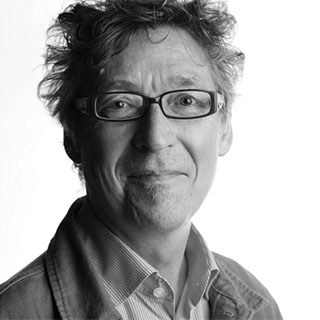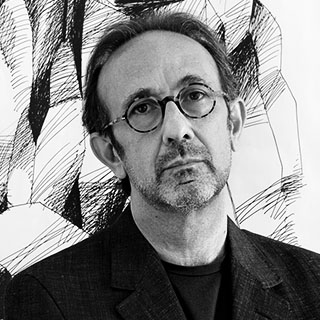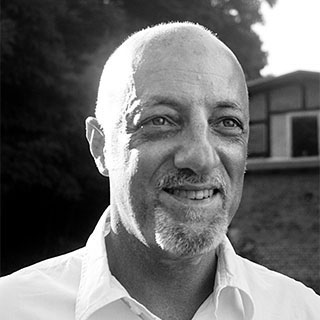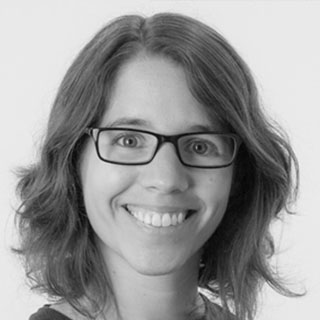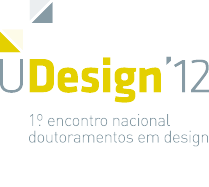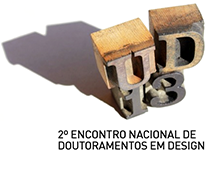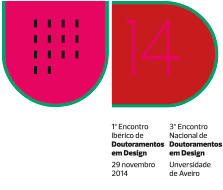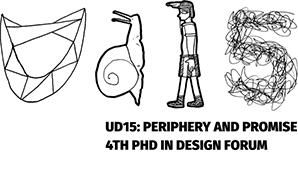UD16 – SUR/VIVAL
UD16 is an annual, peer reviewed meeting, promoted by the PhD Program in Design at the University of Aveiro and the University of Porto. This fifth edition, the second international, is organized by PhD students in Design at the University of Aveiro and aims to gather PhD students, professors, newly PhDs and researchers around the design research on the theme “sur/vival”.
Proceedings
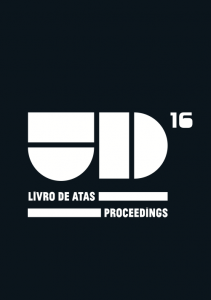
Title
Livro de Atas UD16 – 5º Encontro de Doutoramentos em Design
Editors / Coordinators
Cátia Pereira, Ivo Fonseca, Olinda Martins, Renata Arezes e Silvina Félix.
Design and pagination
Ivo Fonseca, Olinda Martins, Renata Arezes e Silvina Félix.
Publisher
UA Editora
Universidade de Aveiro
Serviços de Biblioteca, Informação Documental e Museologia
1st edition – april 2017
ISBN
978-972-789-504-5
The UD16 Book of Abstracts is also available for download.
PRESENTATION
In the present context, characterized by uncertainty and complexity, it is up to design to challenge, question and materialize, contributing to the (re)significance of human presence in the world; and life, in its various dimensions.
Design research, as a way creating of a better understanding of the experience of living, and surviving (according to its latin etymon – supervivĕre, meaning to surpass life and obstacles, and go beyond) is also the basis for the activity of design as practice, as well as the creation of new solutions to complex problems that affect the existence, preservation and continuity of people, cultures and places.
Sobrevivência = Supervivĕre = Survival is thus the theme chosen for reflection; from the polysemy of the word to semantic constellation that opens up to the world: the essential and the superfluous; the basic and luxurious; the material and the spiritual.
Sobrevivência, Supervivĕre, Survival, Revivência, Revivĕre, Revival… Beyond, Over, About, For … What kind of living do we want to design?
PROGRAM
Hour |
Room 1 |
Room 2 |
| 08h30am 09h30am | Reception and registration | |
| 09h30am 10h00am | Opening Session:
Rector of the University of Aveiro DeCA Director ID+ Director PhD Design Director – University of Aveiro |
|
| 10h00am 11h00am | Keynote: Ana Correia de Barros Old people, young design researchers and participatory design |
|
| 11h00am 11h30am | Coffee break | |
| 11h30am 12h45pm | Session 1A – SURVIVAL
Fernanda Pina, Vera Damazio and Marília Ceccon Renata Arezes and Joana Quental Ivo Fonseca, Pedro Bessa and Mário Vairinhos Silvia Maria Gramegna and Alessandro Biamonti |
Sessão 1B – ON LIVING
Syomara Pinto, Cláudia Romero, Joana Cunha and Joana Quental Susana Azevedo Cardal Liene Jakobsone Isa Tiburcio André Abrahão, Ana Veloso, Mário Vairinhos and Vasco Branco |
| 12h45pm 02h15pm | Lunch | |
| 02h30pm 03h30pm | Session 2A – ON LIVING
Airton Filho and Marshal Lauzer Yanick Trindade Ana Dalagnoli, Marshal Lauzer and Flávio Santos Valéria Boelter e Débora Aita Gasparetto |
Sessão 2B – FOR LIVING
Raquel Pires, João Mota and Katja Tschimmel Patrícia Wielewicki, Rui Roda and Manuel Graça Cristiane Menezes, Nuno Dias and Vasco Branco Raul Pinto, Derya Irkdas Dogu, Can Ozcan, Paul Atkinson, Joaquim Vieira and Miguel Carvalhais |
| 03h30pm 04h30pm | Keynote: Alastair Fuad-Luke An expanded field of resilient agri-culture: Design challenges, dissonant acts and opportunities |
|
| 04h30pm 05h00pm | Coffee break | |
| 05h00pm 06h00pm | Session 3A – SURVIVAL
Carlos Delano Rodrigues, Carlo Franzato and Rita Almendra Ana Oliveira, Rita Engler and Nadja Mourão António Gorgel Pinto Ana Roberti |
Session 3B – Posters
Marta Santos Felipe Domingues, Salvatore Zingale and Dijon De Moraes Natália Plentz Melissa Pozatti Cláudio Sampaio, Suzana Martins, Fernando Moreira da Silva and Rita Almendra Cátia Pereira, Teresa Franqueira and Álvaro Sousa |
| 07h00pm 08h00pm | Walk through he streets of Aveiro with the Aveiro Free Walking Tour (based on tips) | |
| 08h30pm | Dinner at the Mercado do Peixe restaurant | |
UD16 Dinner
The UD16 dinner will take place at restaurant Mercado do Peixe, at 8h30pm. More info and registration here.
Time |
Room 1 |
Room 2 |
| 09h00am 10h00am | Reception and registration | |
| 10h00am 11h00am | Keynote: Mario Trimarchi Living in Silence |
|
| 11h00am 11h30am | Coffee break | |
| 11h30am 12h45pm | Session 4A – ABOUT LIVING
Cristiana Serejo Fernando Rojas, Stuart English, Robert Young and Nick Spencer Olinda Martins, Joana Quental and Alice Semedo Paulo Marcelo Mariana Leão |
Session 4B – FOR LIVING
Silvina Felix and Nuno Dias Artemisia Caldas, Miguel Carvalho and Humberto Lopes Germana Bezerra and Miguel Carvalho Leonardo Martins, Mario Lima, Jackeline Farbiarz and Luiza Novaes Renato Bispo and Vasco Branco |
| 12h45pm 02h15pm | Almoço | |
| 02h30pm 03h30pm | Session 5A – FOR LIVING
João Costa, Liliana Soares and Eduarda Gomes Humberto Costa and Aguinaldo dos Santos Aline Souza, Lia Krucken and Rita Almendra Susana Fernandes, J. L. Esteves, Paulo Bago de Uva and Ricardo Simões |
Session 5B – ABOUT LIVING
Ana Oliveira, Nadja Mourão, Samantha Moreira Luiza Arigoni and Vera Damazio Marília Ceccon, Vera Damazio and Cristiane Duarte Marta Rodrigues |
| 03h30pm 04h30pm | Keynote: Rafael Cardoso Urbanização, informação e interface: Fundamentos históricos do design como estrutura epistemológica |
|
| 04h30pm 05h00pm | Coffee break | |
| 05h00pm 06h00pm | Session 6A – ON LIVING
Marlene Ribeiro and Francisco Providência Emílio Santos Rafael Arnoni and Susana Barreto Iara Braga, Maria José Abreu and Madalena Oliveira |
Session 6B – ON LIVING
Sandra Silva Marta Calejo and Graça Magalhães Daniela Brisolara |
| 06h00pm 06h30pm | Closing Session:
Phd Design Vice-Director – University of Aveiro PhD Design Director – University of Porto |
|
CALL FOR PAPERS
The UD16 committee calls for the submission of original contributions in the field of research in design, crossing the theory and the practice.
The submission of papers (articles and posters) should be made through the EasyChair system. The Scientific Committee will assess submitted papers in a double blind peer-review system. All proposals accepted will be invited to present their work in an oral communication format.
The papers presented at the meeting will be published in the conference book in digital format with ISBN, available after the meeting or in a date to be set by the Organizing Committee and informed during the event.
Proposals may not contain elements that identify the authors. The EasyChair system will perform the registration of each proposal, which must meet the following parameters (in english):
- Title;
- Abstract (up to 500 words);
- Category (article or poster);
- Keywords (up to 5 keywords);
- Topics (thematic fields);
- Attached file with the article or poster proposal in .pdf.
Article:
- Article body up to 3000 words;
- References formatted in APA standard.
Poster:
This condensed presentation format combines the presentation of a short text and a picture of the ongoing investigation, and should have:
- Title (up to 100 characters including spaces);
- Keywords (up to 5 keywords);
- Research question (between 500 and 2500 characters including spaces);
- Abstract (up to 500 words); Abstracts should be submitted in the EasyChair platform only, not in the poster;
- Body / research (between 500 and 2500 characters including spaces);
- References formatted in APA Standard (up to 5 references);
- Images (total print area: 2130 x 2980 px).
Submission of revised papers
The authors whose works were approved by the scientific committee should send the final version of the paper / poster until July 1 to ud16conference+final@gmail.com. The revised work should use the templates provided below with the identification and affiliation of the author(s).
The authors should also fill out the registration form available on this website and make the appropriate payment to validate the registration.
THEMATIC FIELDS
The areas of research suggested to the UD16 call for papers are:
Sobre-Vivência / On Living
Design can provide a fundamental contribution to the development and as a statement of societies, as a collective, and of the citizen, as an individual. Its role addresses both economic and social challenges, and at the same time works as a catalyst for change. Its potencial lies in the conflicts from which it is born or that creates, through a game of opposites resulting sometimes in the redefinition of its own game rules.
This thematic field seeks to look into the living, in order to expose the representativeness of interaction through artifacts, meanings and experiences. It seeks a reflection on the practice of design and its role as an agent of change in social and economic paradigms.
Submitted researches may include multiple approaches to Design in fields such as: the rational and the emotional; experience and practice; individual and/or collective; awareness and unawareness; ethics and morals; ergonomics; normativeness; the infra and the super, while questioning the challenges of the meaning and the value of Design.
Sobrevivência / Survival
Contemporary society faces complex challenges that result from a paradoxical world and a permanent tension between creating and responding to the various and sometimes conflicting needs.
Under this topic we look for a critical reflection that can present solutions to issues such as the survival of the human being and the current society as a space of equality, freedom and conscious expression. Design is understood as a strategic instrument of action in economics and social policies, in public and civil sectors. So what is the role of design in defining the value of the society? What new models can be defined and what are the contributions of the different actors involved? What is its influence on the significance of ethics and social rules?
Submissions are required to illustrate this reflection, presenting case studies or practices and strategies of design contributions for diversity and inclusion, and design for the development of literacy (of the media). The works should approach issues such as collective and uniqueness; collaborative and individualism; rational and limbic consciousness (or the limbic); welfare and subsistence; social activism; the immediate and the permanent; the resistance and the massification; simplicity and complexity, while questioning what are the roles of Design before the challenge of survival.
Sobre a Vivência / About Living
The cultural legacy of a society is an invaluable asset, considering its essential contribution in defining its identity and its strategic action, and therefore, important in the present as well as in the future. The immersion in the process of doing and making it happen looks for references which favour reflection and understanding in the search of inovation through continuity or rupture. As in other fields, the creative process in design starts from previous records, similarities that evoke questions, destabilize and encourage critical thinking, triggering other ways of action and of thinking.
In order to identify and understand meanings and values of the living in community, we are seeking inputs from an active history in the future cultural heritage through Design. Submissions should reflect on the past; history; culture; memory; identity; persistence; the continuity of making (material/immaterial); and also on the design’s contribution to its preservation.
Para a Vivência / For living
The growing interrelationship between design, science and technology proves to be as complex as constructive.
From its interaction practices and theories, new forms of involvement and collaboration are developed. In addition to the direct benefits that new products can bring, interdisciplinary studies practices also contribute to new forms of action and awareness, which go far beyond technology by defining its spaces in areas such as ecology and social cooperation, looking for influence through the integration into a more global awareness. We talk about the present, and further more about its future projection.
This theme encourages contributions that show the strategic role of design for sustainability; design for industrial innovation and economic development. Submitted papers should explore topics such as the future; creating strategies; innovation; trends; consumption; anticipation; support; sustainability; ecodesign; eco-innovation, while questioning the instrumental and political role of Design.
ABOUT THE CONFERENCE
Important Dates
February 1st 2016: Call for papers
February 1st 2016 to April 18th 2016: Last Call Closing of the call for papers
June 7th 2016: Notification of acceptance
June 20th 2016: Closing of the registration (1st phase)
July 12th 2016: Closing of the registration (2nd phase)
July 22nd and 23rd 2016: UD16
Scientific Commitee
Alastair Fuad-Luke Free University of Bozen-Bolzano
Alexander Schwinghammer Bauhaus-Universität Weimar
Alexandra Cruchinho ESART, Instituto Politécnico de Castelo Branco
Álvaro Sousa Universidade de Aveiro, ID+
António Costa Valente Universidade de Aveiro, ID+
Cláudia Albino Universidade de Aveiro, ID+
Daniel Raposo Instistuto Politécnico de Castelo Branco
Eduardo Corte-Real Instituto de Arte, Design e Empresa
Fátima Pombo Universidade de Aveiro, ID+
Fernando Moreira da Silva Universidade de Lisboa, CIAUD
Filipe Campelo Xavier da Costa Unisinos
Francisco Providência Universidade de Aveiro, ID+
Graça Magalhães Universidade de Aveiro, ID+
Heitor Alvelos Universidade do Porto, ID+, UTAustinPortugal
Helena Barbosa Universidade de Aveiro, ID+
Isabel Campi Valls Universitat Barcelona
Joana Cunha Universidade do Minho
Joana Quental Universidade de Aveiro, ID+
João Cruz Universidade do Porto, ID+
João A. Mota Universidade de Aveiro, ID+
João Sampaio Universidade de Aveiro
Jorge dos Reis Universidade de Lisboa
Kátia Sá Escola Superior de Educação de Lisboa
KátjaTschimmel ESAD Matosinhos, ID+, Mindshake
Luís Marques Ferreira Instituto Politécnico de Castelo Branco, Universidade de Aveiro
Luísa Ribas Universidade de Lisboa, ID+
Mário Vairinhos Universidade de Aveiro, ID+
Marta Pinto Faculdade de Psicologia e de Ciências da Educação, Universidade do Porto
Miguel Carvalhais Universidade do Porto, ID+
Nuno Dias Universidade de Aveiro, ID+
Paulo Maldonado Universidade Lusíada
Pedro Carvalho de Almeida Universidade de Aveiro, ID+
Pedro Bessa Universidade de Aveiro, ID+
Peter McGrory Aalto University
Rachel Zuanon Universidade Anhembi/Morumbi
Rafaela Norogrando Instituto Politécnico de Viseu, Universidade da Beira Interior
Raul Cunca Universidade de Lisboa
Régio Pierre da Silva Universidade Federal de Rio Grande do Sul
Rui Mendonça Universidade do Porto, ID+
Rui Costa Universidade de Aveiro, ID+
Susana Barreto Universidade do Porto, ID+
Teresa Franqueira Universidade de Aveiro, ID+
Teresa Cruz Universidade de Lisboa
Vasco Branco Universidade de Aveiro, ID+
Wellington de Medeiros Universidade Federal de Campina Grande
Executive Committee
Francisco Providência
Joana Quental
André Abrahão
Bárbara Araújo
Cátia Pereira
Cristiane Menezes
Diogo Frias
Ivo Fonseca
Joana Ivónia Santos
Marlene Ribeiro
Olinda Martins
Renata Arezes
Syomara Pinto
Susana Fernandes
Silvina Félix
Previous Conferences
Location and Contacts
Departamento de Comunicação e Arte
Universidade de Aveiro
Campus Universitário de Santiago
3810-132 Aveiro
Portugal
Accomodation Alternatives
The prices presented below are for convenience only. Please contact the hotels for an updated quote.
Hotel Aveiro Center
★★
Exclusive prices for UD16 attendees:
Single room – 43€
Double room – 55€
FAQ
How to get to Portugal?
Besides the regular flight companies, there are some low-cost flight options within Europe to Portugal. Ryanairflies to Porto and Lisbon, and Easyjetflies to Lisbon. The closest airport to Aveiro is the Aeroporto Francisco Sá Carneiro, in Porto.
How to get a train to Aveiro from Sá Carneiro airport?
You can take a taxi from the airport to Campanhã train station, which will take approximately 15 minutes (depending on traffic), and which costs approximately €20.
There is also a metro between the airport and Campanhã train station, which leaves every half hour. The journey takes about 35 minutes, and costs €1,80.
Info: Porto Metro
What are the options to go to Aveiro from Porto?
By train: there are frequent services to Aveiro from Campanhã train station. The train options are the Alfa-Pendular, the Intercidades or the Urbano, which range in price from €14,20 to €3.35 respectively. The train journey from Porto to Aveiro takes between 30 minutes to approximately one hour, depending on the type of train (the Alfa-Pendular is the fastest).
Info: Trains of Portugal
By car: Just take the A1 towards Lisbon, or the A29 towards Aveiro. The journey takes approximately 50 minutes (78 km), and the toll cost is approximately €4,70.
How to get a train to Aveiro from Lisbon Airport?
There is a metro from Lisbon Airportto Oriente train station that takes 10 minutes approximately, and costs €1,40.
Info: Lisbon Metro
What are the options to go to Aveiro from Lisbon?
By train: at Oriente train station there are regular services to Aveiro (Alfa-Pendular train or Intercidades train). The journey to Aveiro takes approximately 2.5 hours, with train tickets varying between €26,30 to €20,20.
By car: take the A1 towards Porto (254 km/approximately 2.5 hours). Turn off at the exit for Aveiro Sul (exit/ saída 15). Aveiro is a further 10 minutes drive along the N235.
How to get to the conference location from Aveiro?
From Aveiro train station: on foot, it takes approximately 30 minutes to reach the University.
By bus, the journey takes 15 minutes.
By taxi, the journey takes approximately 5 minutes (depending on traffic), and costs around €5.
By car: once you reach Aveiro, the University is well sign-posted.
Photos
Use the hashtag #ud16aveiro in your Instagram photos and share your experience to the memory of this meeting. View or download our complete selection of photos in http://tinyurl.com/ud16fotos.
